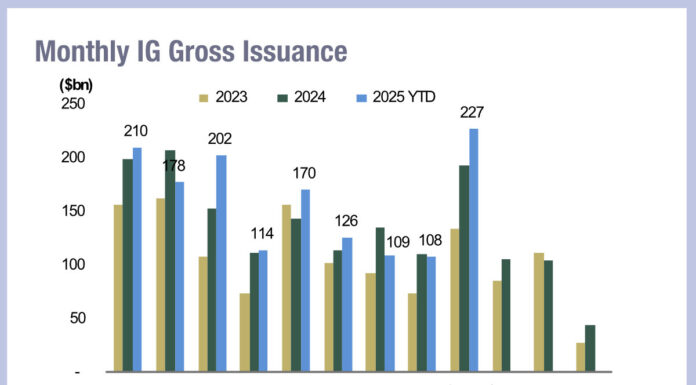When you open up a market to a broader range of customers, you need to ensure the infrastructure is robust and efficient, with new workflows made as streamlined, standardised and automated as possible. By Li Renn Tsai, Head of Asia, Tradeweb.
This, of course, has been the ideal modus operandi for any market structure operator or trading platform provider seeking to banish the forces of inertia that can prevent market participants from realising the benefits of electronic trading. But the lessons of past experience really have been taken to heart in the design and construction of Bond Connect, which was built in partnership with Tradeweb, using our expertise to ensure it reflects best practices in buy-side trading rooms across the globe and requires minimal implementation effort prior to trading.
Bond Connect was launched in July by the China Foreign Exchange Trade System & National Interbank Funding Centre (CFETS) and Hong Kong Exchanges and Clearing, to facilitate increased foreign participation in the Chinese Interbank Bond Market (CIBM). Both before and during Bond Connect’s construction, Tradeweb contributed its expertise in fixed income electronic markets to its design, and solicited detailed feedback from offshore investors regarding their pain points associated with existing access schemes.
Today, Bond Connect is live for international institutions seeking investments in the CIBM. Onshore investor access to offshore over-the-counter (OTC) fixed income markets will follow in due course.
Bond Connect is built for the long term. It is both part of China’s efforts to encourage greater foreign investment (easier access is a prerequisite to inclusion of Chinese debt instruments in global bond indices) and to accommodate the subsequent anticipated volume growth. China’s bond market, at US$9.6 trillion, is already the third largest in the world. It is widely expected to double in size over the next 10 years.
To handle high volumes and the wide range of participants that will generate them, only the most efficient processes and practices will suffice. This means placing electronic trading and the disclosed multi-dealer request-for-quote (RFQ) protocol, which Tradeweb pioneered, at the centre of the Bond Connect trading process.
Prior to Bond Connect, access to Chinese bonds under existing frameworks for foreign investors (QFII, R-QFII and CIBM Direct) was fraught with the constraints faced by fixed income investors in emerging markets in Asia and beyond. Sources of delay, cost and uncertainty included onboarding and registration processes, due diligence and selection of onshore settlement agents, as well as reporting of and restrictions on the size and direction of investment activity. Moreover, trading was executed via manual, unstructured and typically voice-broked trading processes for establishing price and liquidity levels, all of which are susceptible to operational risks, highly time-consuming and severely lacking in transparency and auditability.
In contrast, today’s authorisation of foreign investors to access Bond Connect through Tradeweb takes a week or two, whilst existing custodian and depository arrangements can now be used for settlement. This is achieved via nominee accounts held by the HKMA’s Central Moneymarkets Unit at the China Central Depository & Clearing and Shanghai Clearing House. Furthermore, there are no quotas on investment and no restrictions on fund movements in and out of China. What’s more, foreign investors can choose between T+0, T+1 and T+2 settlement times.
Most critically, international institutions can issue disclosed RFQs electronically to up to 10 of the currently participating 24-plus onshore market-makers directly from the Tradeweb interface already integrated into their OMS, thus minimising operational risks and ensuring optimum convenience and flexibility. Thanks to the direct connection between Tradeweb and CFETS, once an offshore investor has a trade accepted by an onshore dealer, CFETS will then confirm the trade, which will appear in the blotter window.
Bond Connect fulfils a specific strategic purpose for Chinese policy makers. It provides the kind of streamlined direct access channel required to smooth the path to the inclusion of Chinese debt instruments in global bond indexes, thus stimulating foreign investment beyond current levels. Past experience suggests that it will take time to grow, but also demonstrates that patience is rewarded.
Following the creation of Stock Connect links between the Hong Kong, Shanghai and Shenzhen equity markets, and the access and transparency that they created, it has been announced that Chinese stocks will be included in the MSCI Emerging Markets Index next year, expecting to account for 1% of the index by August 2018. It is likely Bond Connect will have time to evolve and hone its trading and other processes as foreign ownership of Chinese bonds increases steadily from current levels (around 2% by most estimates) to the significantly higher levels forecast in the coming decade.
Bond Connect meets China’s particular needs by making it easy for foreign market participants to trade its bonds electronically, as and when their investment strategies dictate. But it is not operating in isolation. Markets around Asia are competing for inward investment from global institutions and will be set on high alert by the potentially game-changing impact of Bond Connect, which makes China’s combination of liquidity, access and yield increasingly compelling for investors. Electronic trading capabilities will not be the only tool available in the race to attract investors, but Bond Connect has raised the bar significantly.
As more markets in Asia and around the world pivot toward electronic trading of fixed income instruments, Tradeweb will look to support new initiatives in the interest of facilitating simpler, cheaper and more efficient trading and investment processes. Tradeweb is the natural partner of choice given our technology expertise and our network of investors from over 2,000 institutions around the world.

www.tradeweb.com
©Markets Media Europe 2025













